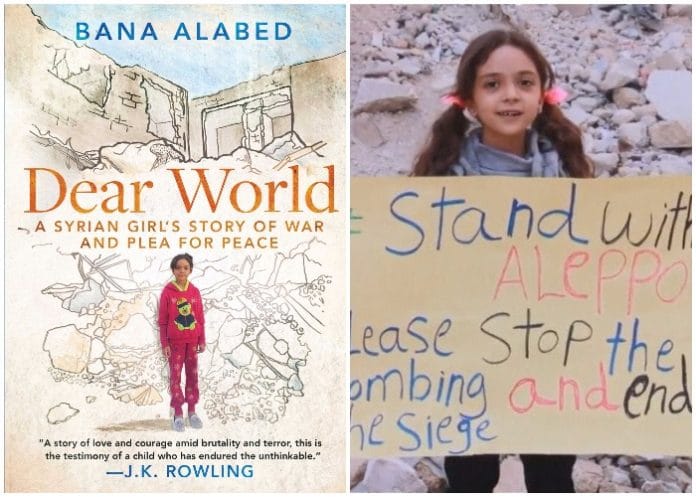‘Dear World’ is the bitter-sweet story of Bana Alabed, who started writing it as a seven-year-old amid the horrors of war in Aleppo, Syria.
Bana Alabed’s ‘Dear World’ looks like a baby book – only it is interspersed with death, pictures of bombings and homes blasted to rubble.
Seven years old when she started writing this book, Bana lived in Aleppo, Syria, and grew up with her siblings and parents in a happy environment. Then, bombs started raining on Aleppo, destroying all evidence that a bustling city existed at the spot.
‘Dear World’ weaves together two narratives: Bana’s experience of the war, and short interludes by her mother, who writes about trying to maintain composure and bring up her three children as “normally” as possible when all hell breaks loose around them. “I would and will do anything to keep you safe, Bana, but I will not silence you. That is what they want,” her mother writes.
Today, the Syrian Civil War has been going on for six years, seven months, and three weeks, with no respite. The Syrian Free Army, Bashar al-Assad’s government, Kurdish forces, and the Islamic State continue to fight it out, and as the old African proverb says, “when elephants fight, it is the grass that suffers”.
Finding joy amid the ruins
Children have their curious ways of seeing a war. In the 1987 movie ‘Hope and Glory’, set in World War II London, children celebrated their school being destroyed, because it meant a holiday and more play-time.
Similarly, Bana’s book tortures the conscience of the reader with its innocence, and its ability to find lotuses in the mud. In the chapter titled, “We all knew what to do when we heard the bombs”, the little girl goes on to describe her family’s contingency plans, and the different kinds of bombs that she had learnt to distinguish. In another instance, Bana sees her best friend’s mangled body being unearthed, something no one should have to see.
She tries to normalise what is happening around her, and finds moments of joy. A refugee in her own city, she builds a see-saw out of pillows and wood in a makeshift home.
Bana, who gets a pair of bright pink shoes for Eid, worries about them incessantly when her family has to hide in the basement while being bombed. It is these little moments in the book that make it so bitter-sweet. It also renders the reader helpless as the horrors continue.
When will the world learn its lesson?
While reading the book, a picture kept popping up in my mind – the 1972 picture from Vietnam often called the ‘Napalm Girl’, considered one of the most shocking photographs, which rattled the collective conscience of the world.
Decades later, when the world thought it had learnt its lessons, Omran Daqneesh’s picture showed it hadn’t. It was another “disturbing” picture – a little boy plopped on the back of an ambulance, covered in dust, while his home lay in tatters in Aleppo.
The lifeless body of Alan Kurdi washing up on the Turkish shore was a reminder to everyone that not every child was lucky to escape like Bana Alabed. While we continue to read this, more children in Syria, Myanmar, South Sudan, and Afghanistan will have been killed mercilessly.
There must be hundreds of Bana Alabeds going through similar trauma and despair. Must we wait for desperate Twitter posts before we turn and look?
‘Dear World: A Syrian Girl’s Story of War and Plea for Peace by Bana Alabed’ has been published by Simon & Schuster.







Reminds me of the film ‘life is beautiful’.against all odds children are still trying when the elders are mindless.
I quite like this article. If only our government took cues.